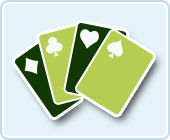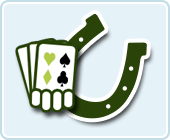Poker Odds Made Simple
 While thousands of Brits play online poker regularly, not all of them play as smartly as they could. What's essential to being a smart, savvy poker player? Understanding the odds of the game. While every poker player knows you can't win all the time, he also knows that losing on a consistent basis is discouraging and takes the enjoyment right out of the game. Understanding odds can help you improve how smartly you play to win more often.
While thousands of Brits play online poker regularly, not all of them play as smartly as they could. What's essential to being a smart, savvy poker player? Understanding the odds of the game. While every poker player knows you can't win all the time, he also knows that losing on a consistent basis is discouraging and takes the enjoyment right out of the game. Understanding odds can help you improve how smartly you play to win more often.
Poker odds don't have to be confusing or complicated. And while you don't need to be a math expert to be a good poker player, understanding the odds of this popular game gives you an advantage to know how to bet and when. With a good understanding of probability and the easy-to-follow explanations in this article, you'll have a solid understanding of poker odds that will lead to a more winning experience playing.
Poker Pot Odds
 The aim of every poker hand is to win the money in the pot. But you have to spend money with each bet and call to win that money. Calculating pot odds helps you understand whether it's worth it to bet and how often you need to win the money in the pot to be profitable. Since you cannot win the money in the pot every time, you need to know if you're more likely to win than you have to pay.
The aim of every poker hand is to win the money in the pot. But you have to spend money with each bet and call to win that money. Calculating pot odds helps you understand whether it's worth it to bet and how often you need to win the money in the pot to be profitable. Since you cannot win the money in the pot every time, you need to know if you're more likely to win than you have to pay.
The first thing to understand about pot odds is that you can't look at poker as one game at a time; instead, you must look at it as a series of games. Looking at playing poker as a long-term endeavor enables you to choose moves that pay off in the long run to make a profit. Making moves that don't pay off in the long run turn your possible profit into a definite loss.
The next thing to understand about pot odds is whether it's worth it to bet a hand relative to the amount in the pot. The best way to do this is to calculate the ratio of the size of the pot to the size of the bet. You calculate it by putting the amount of the pot on the left hand of the colon and the amount of the bet on the right. So if the amount of the pot is £75 and the bet is £5, your odds are 75:5 (read as "75 to 5"). To reduce odds to the simplest terms, if the number on the left of the colon can be divided by the number on the right, do so to simplify the odds. In this case, 75:5 multiplies down to 15:1. It's worth it to invest £1 for a chance at $15, or a small amount for a large pot, whereas is the bet was £25 it may not be.
Once you determine your pot odds, the next step to calculating poker odds is understanding the odds of you making a winning hand.
Counting "Outs"

Simply put, outs are cards that can add to the hand you're trying to put together. The more outs you have available to you (ideally 1 to 15 cards), the more possibilities you have of improving your hand and winning the pot. And the less outs you have, the lower your chances are of attaining a desirable hand and winning. Assessing your hand after the flop is the best way to calculate your outs.
For example, if you have a flush draw, with two of the flop cards in the same suit as two in the hand you're holding, you have nine outs to make a flush, because there are 13 cards per suit and four are available to you.
Or, if you are holding two cards in a lower pair, with one of the flop cards being higher (which could give another player a higher pair than the one you're holding), you have only two outs to make three of a kind or better.
If the outs are in your favor, combining the outs and odds will help you know how to make your next move.
Odds and Outs Combined

Calculating odds and outs can also help you understand your chances that the river card will improve your hand. Simply subtract the number of outs available to you from the number of cards left, and you'll be able to determine if the river card can be the card that helps you make the best hand possible.
Knowing odds and outs is easy to do and helps you calculate your risk to know how to play poker smartly to win more often and enjoy the game more.


